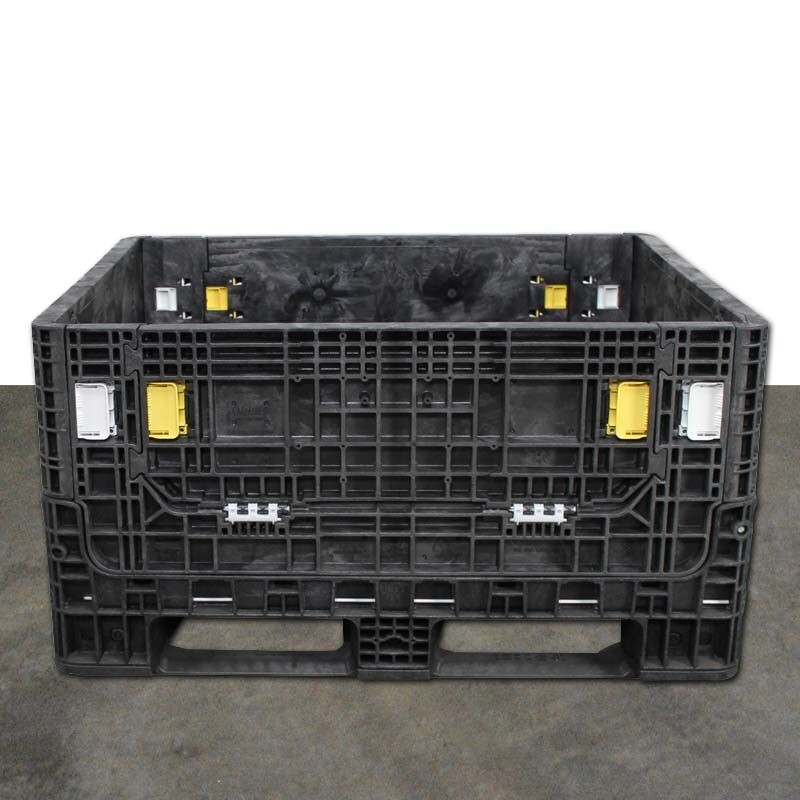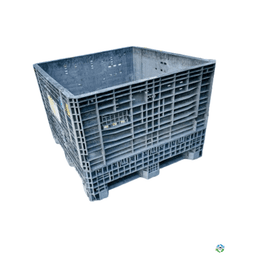The Ultimate Overview to Choosing the Right Mass Containers for Your Service Demands
Picking the suitable mass containers is critical for any kind of company that counts on efficient logistics. Different sorts of containers exist, each designed for details products and applications. Aspects such as size, material compatibility, and governing criteria play a substantial duty in this decision-making process. Understanding these components can lead to enhanced operational performance. Nevertheless, lots of companies forget necessary aspects that could improve their total efficiency and sustainability. What are these considerations?
Understanding Various Sorts Of Bulk Containers
Mass containers offer as essential tools for services seeking efficient storage space and transport options. These containers are available in various types, each designed to fulfill particular operational requirements. One usual kind is the intermediate mass container (IBC), which is ideal for liquid and granulated materials, offering a balance of capability and maneuverability. Another popular choice is the mass bag, or FIBC, suitable for completely dry, flowable items. These versatile containers are light-weight and can be easily transported and kept. For heavier products, stiff bulk containers are usually used, supplying toughness and stability for secure handling. Furthermore, there are specialized containers customized for dangerous products, making sure conformity with safety and security guidelines. Understanding the distinctive qualities of these bulk container kinds enables companies to make educated choices that enhance logistics and minimize expenses. By picking the ideal container, companies can enhance their operational efficiency and simplify their supply chain processes.
Secret Product Considerations for Mass Containers
When picking bulk containers, it is vital to ponder the products made use of in their building and construction. Factors such as chemical, sturdiness, and strength compatibility play a crucial role in making certain the containers fulfill certain functional requirements. In addition, weight and portability worries can impact both effectiveness and transportation logistics.
Product Toughness and Strength
Durability and strength are critical consider choosing products for mass containers, as they directly influence the container's capability to hold up against numerous environmental problems and managing processes. Products such as high-density polyethylene (HDPE), polypropylene, and stainless-steel are frequently favored for their robust properties, offering resistance to temperature, influence, and abrasion variations. The choice of product likewise impacts the total life expectancy of the container; more powerful products typically result in much less frequent substitutes, bring about set you back savings in time. Additionally, the weight of the product can affect delivery prices and convenience of handling. Services should consider their details operational environments and the capacity for deterioration to assure peak sturdiness and toughness in their bulk container option.
Chemical Compatibility Variables
Understanding chemical compatibility is essential for choosing bulk containers, as the products utilized must withstand the certain materials they will certainly hold. Various elements affect compatibility, consisting of the chemical nature of the contents, temperature level, and duration of storage. Corrosive chemicals may require containers made from stainless steel or specialized plastics that stand up to degradation. Furthermore, responsive substances can produce warm or gases, demanding vented or pressure-rated containers. The selection of container material, whether polycarbonate, polyethylene, or steel, ought to straighten with the chemical residential properties of the saved materials to stop breaches or leakages. Ultimately, an extensive evaluation of these compatibility elements ensures secure handling and storage space, protecting both employees and the setting while preserving product honesty.
Weight and Transportability Worries
Picking bulk containers involves not just assessing chemical compatibility however additionally considering weight and portability. Businesses must evaluate the ease of handling and transportation to enhance efficiency. Lightweight materials like high-density polyethylene (HDPE) or light weight aluminum can promote easier motion and decrease delivery costs. Alternatively, larger containers might offer improved resilience but can prevent mobility, especially in atmospheres requiring frequent relocation. In addition, the style of the container need to permit convenient lifting and piling, making sure ergonomic safety for workers. Companies must additionally think about the framework available for transport; for instance, containers suitable with forklifts or pallet jacks can improve procedures. Ultimately, the best balance between weight and transportability straight influences functional effectiveness and expense effectiveness.
Sizing Your Mass Containers for Optimal Effectiveness
When sizing bulk containers, services need to very carefully analyze the dimensions needed to accommodate their particular items. In addition, weight capability is a critical aspect that influences effectiveness and security throughout transportation and storage. Efficient sizing not just takes full advantage of room however also maximizes functional workflows.
Identifying Container Dimensions
Selecting the best dimensions for bulk containers is crucial for optimizing effectiveness in storage space and transport. Organizations need to assess their specific needs, taking into consideration variables such as offered area, the nature of the products being kept, and the approaches of transportation used. Exact dimensions guarantee that containers fit preferably in storehouses and automobiles, decreasing squandered room and lowering handling time. Requirement dimensions can use comfort, yet custom dimensions could be essential for one-of-a-kind demands or to suit particular products. Furthermore, it is vital to evaluate piling capacities and ease of access, as these aspects influence overall functional effectiveness. Eventually, the appropriate measurements lead to boosted organization and structured logistics, benefiting the general efficiency of business.
Weight Capability Considerations
Understanding weight capacity is crucial for businesses intending to optimize their mass container performance. The weight capacity of a container straight impacts storage capacities, transport logistics, and general functional prices. Selecting containers with the appropriate weight limitations ensures that organizations can securely save and deliver their goods without taking the chance of damage or compliance problems. Overloading containers can bring about architectural failures, while underutilizing capability lead to thrown away sources. It is essential for services to analyze their product weights and take this contact form into consideration any regulatory requirements when choosing containers. In addition, factors such as the sort of material, meant use, and environmental conditions must also affect weight ability choices. By examining these components, businesses can enhance efficiency and ensure a streamlined supply chain.
Regulatory Conformity and Safety And Security Criteria

Regulatory conformity and safety and security criteria play a vital role in the choice of mass containers for organizations. Organizations must assure that their containers meet numerous regulations set by regional, nationwide, and worldwide authorities. These criteria frequently concern material security, structural stability, and proper labeling, which assist protect against mishaps and guarantee the secure transportation of items.
Additionally, adherence to industry-specific guidelines, such as those from the Food and Drug Management (FDA) or the Occupational Safety And Security and Health Administration (OSHA), is crucial for business managing hazardous materials or foodstuff. Non-compliance can cause penalties, lawful issues, or damages to a business's track record.
Organizations should also take into consideration the container's compatibility with the materials being saved or transported to prevent contamination or chemical responses (used bulk containers). To sum up, comprehending and executing regulatory conformity and security requirements is important for the accountable and effective use mass containers
Sustainability Choices for Eco-Friendly Mass Containers

Firms are also checking out options made from recycled materials, his explanation which not just save sources however additionally support the reusing sector. Advancements in layout permit for lighter containers that need much less energy to transport, further enhancing sustainability. By integrating these eco-friendly mass container choices, services can show their commitment to environmental stewardship while meeting consumer demand for lasting practices. This shift not just assists the world however can likewise boost brand credibility and customer commitment.
Cost-Effectiveness and Budgeting for Bulk Containers
While several organizations focus on sustainability, cost-effectiveness remains a critical factor when picking bulk containers. Organizations has to examine the initial purchase rate, along with long-lasting operational expenses, to ensure financial viability. Factors such as upkeep, toughness, and reusability play a significant function in identifying overall expenses.
Buying premium containers might yield greater ahead of time costs yet can result in cost savings through lowered replacement rates and decreased waste. Furthermore, services must consider transport prices and storage space efficiency, as these can influence the general budget.

Frequently Asked Inquiries
Just how Do I Identify the Right Container for Hazardous Products?
To establish the best container for hazardous materials, one should review compatibility with the substance, take into consideration the container's product, look for regulatory conformity, and evaluate capability and security attributes to guarantee appropriate handling and storage.
Can Mass Containers Be Customized for Details Products?
Yes, bulk containers can be tailored for specific products. used collapsible containers. Different features, such as dimension, style, and material, can be customized to satisfy unique requirements, ensuring ideal security and performance for carrying and saving different goods
What Is the Typical Life Expectancy of Various Mass Container Types?
The discover this info here typical life expectancy of mass container kinds varies; plastic containers last 5-10 years, steel containers 10-20 years, and wood containers typically last 3-7 years, depending upon usage, maintenance, and ecological problems.
Exactly how Should I Tidy and Maintain Bulk Containers?
To cleanse and keep bulk containers, one must regularly evaluate for damage, remove residue, laundry with proper cleaning agents, wash thoroughly, and warranty appropriate drying before storage. Following manufacturer guidelines improves long life and safety and security during use.
Are There Rental Options for Bulk Containers Available?
Yes, numerous firms supply rental choices for bulk containers, providing flexibility for companies. These rentals can suit various needs, allowing companies to manage supply successfully without the commitment of purchasing containers outright.
Durability and toughness are critical aspects in selecting materials for bulk containers, as they directly affect the container's capability to endure numerous ecological problems and managing processes. Understanding chemical compatibility is vital for selecting bulk containers, as the materials made use of must resist the certain substances they will certainly hold. Recognizing weight ability is crucial for businesses aiming to enhance their mass container performance. Regulatory compliance and safety and security criteria play a necessary duty in the option of mass containers for organizations. While lots of businesses focus on sustainability, cost-effectiveness remains a vital aspect when selecting bulk containers.